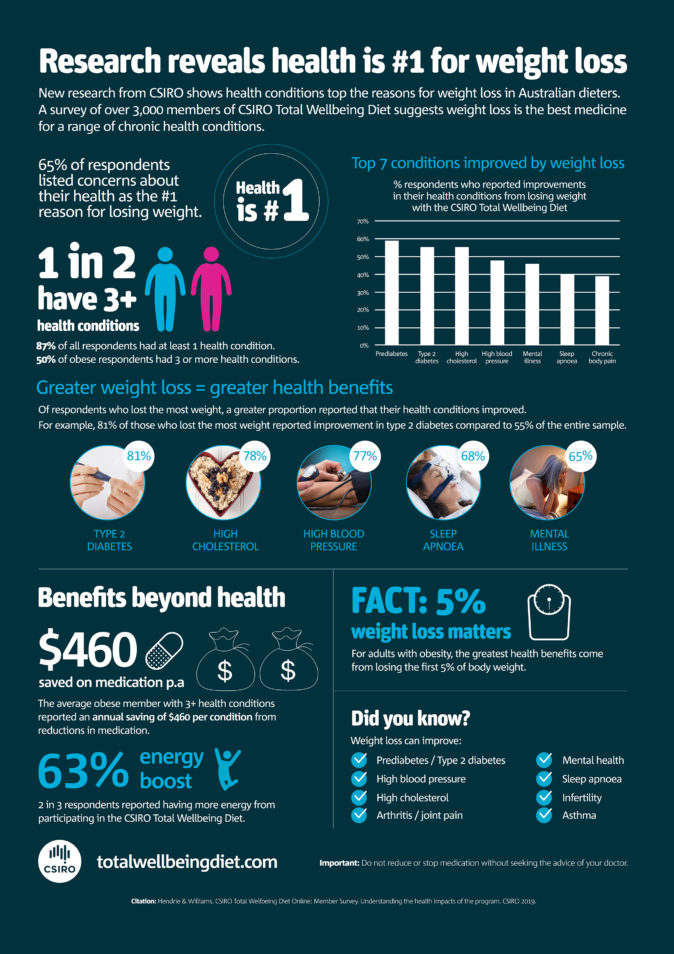
A woman wearing a large white and blue striped sun hat leaning against the edge of a swimming pool with her back to the camera
What’s your motivation to lose weight?
Not too long ago if you spoke to someone about why they were on a weight loss mission you’d hear the same few answers. “I’m going on a holiday,” “I saw a bad photo of myself” or “my wedding’s coming up.”
But we’ve just published new research that shows attitudes to weight loss are shifting. We surveyed more than 3000 of our past and present CSIRO Total Wellbeing Diet Online members. And we found that two out of three people were motivated to lose weight to improve their health, over their appearance.
We also wanted to know what sort of health benefits people were experiencing. In this survey, we found a large number of people who’ve lost weight on the program also reported improvements in a range of health conditions. This includes type 2 diabetes, high blood pressure, cholesterol and sleep apnoea.
Changing focus from the number on your clothing size to the number on the blood pressure monitor is becoming increasingly important. Recent figures from the National Health Survey show nearly 50 per cent of Australians are affected by one or more chronic health conditions. And two-thirds of the Australian population are now overweight or obese. These startling stats show why people are placing higher importance on their health.
So, what health improvements did our respondents find?

Hundreds of different coloured and shaped pills being poured onto a bench
Weight loss can help improve health conditions and lead to a reduction in medications
Reducing weight reduced chronic health symptoms
Almost nine out of ten survey respondents – who were largely overweight or obese – were affected by a pre-existing health condition before starting on our Total Wellbeing Diet Program. Our analysis showed that after following the program, more than half of those who had type 2 diabetes and cholesterol reported an improvement in their health condition.
Excess body fat doesn’t just make our jeans tighter, it can have a serious effect on our health. Think of it this way – the bigger your body, the more work your heart needs to do, making it beat faster which can cause an increase in your blood pressure. Uncontrolled high blood pressure can lead to a number of complications including heart failure and blood clots.
Overweight and obese people see significant health benefits from losing five per cent of their body weight. Losing the first five per cent can have beneficial effects on blood pressure and cholesterol levels. It also improves the way your body regulates and metabolises blood sugar. All these improvements help reduce the risk of type 2 diabetes, heart disease and stroke.
They started catching more Zzzzzzzs
63 per cent of our survey respondents reported higher energy levels and 39 per cent told us they were sleeping better.
Anyone who has had a bad night’s sleep knows the havoc it can wreak with your mood, concentration and wellbeing the next day. But did you know it can also have a negative effect on your health? When we sleep our bodies rest and repair. Not getting enough restful sleep has been found to increase the risk of high blood pressure, increased appetite and levels of blood glucose and insulin. All of which has been associated with weight gain and risk to type 2 diabetes. Being overweight can also lead to sleep apnoea which, if left untreated, can increase the risk of heart attack, stroke, high blood pressure and cardiovascular disease.
Before you go, we have one last important reminder
GPs aren’t just there to treat and prescribe, they are also there to prevent. We encourage you to make a dedicated appointment with your GP to discuss your general health. Get your blood pressure and your cholesterol checked, discuss lifestyle risk factors. And find out what advice and support your GP has to help you improve your health and reduce your risk of disease.
Download the report [pdf · 1mb].

Data about our new research in visual form.
An infographic which highlights our new research.

